Essay on the Interrelationship of Self and Community in CST
VerifiedAdded on 2019/11/12
|8
|1794
|303
Essay
AI Summary
This essay delves into the principles of Catholic Social Thought (CST), examining the intricate relationship between the individual self and the community. It outlines the nine key principles of CST, including the dignity of the human being, the common good, the preferential option for the poor, subsidiarity, the universal purpose of goods, stewardship of creation, the promotion of peace, participation, and global solidarity. The essay argues that these principles are interconnected and mutually reinforcing, fostering a healthy and flourishing relationship between individuals and the community. The essay explores how respecting individual dignity, striving for the common good, and practicing solidarity contribute to a just and equitable society. It emphasizes that the well-being of the self and the community are interdependent, and that CST provides a framework for building a society where all individuals can thrive. The conclusion highlights the importance of these principles in creating a just and flourishing society.
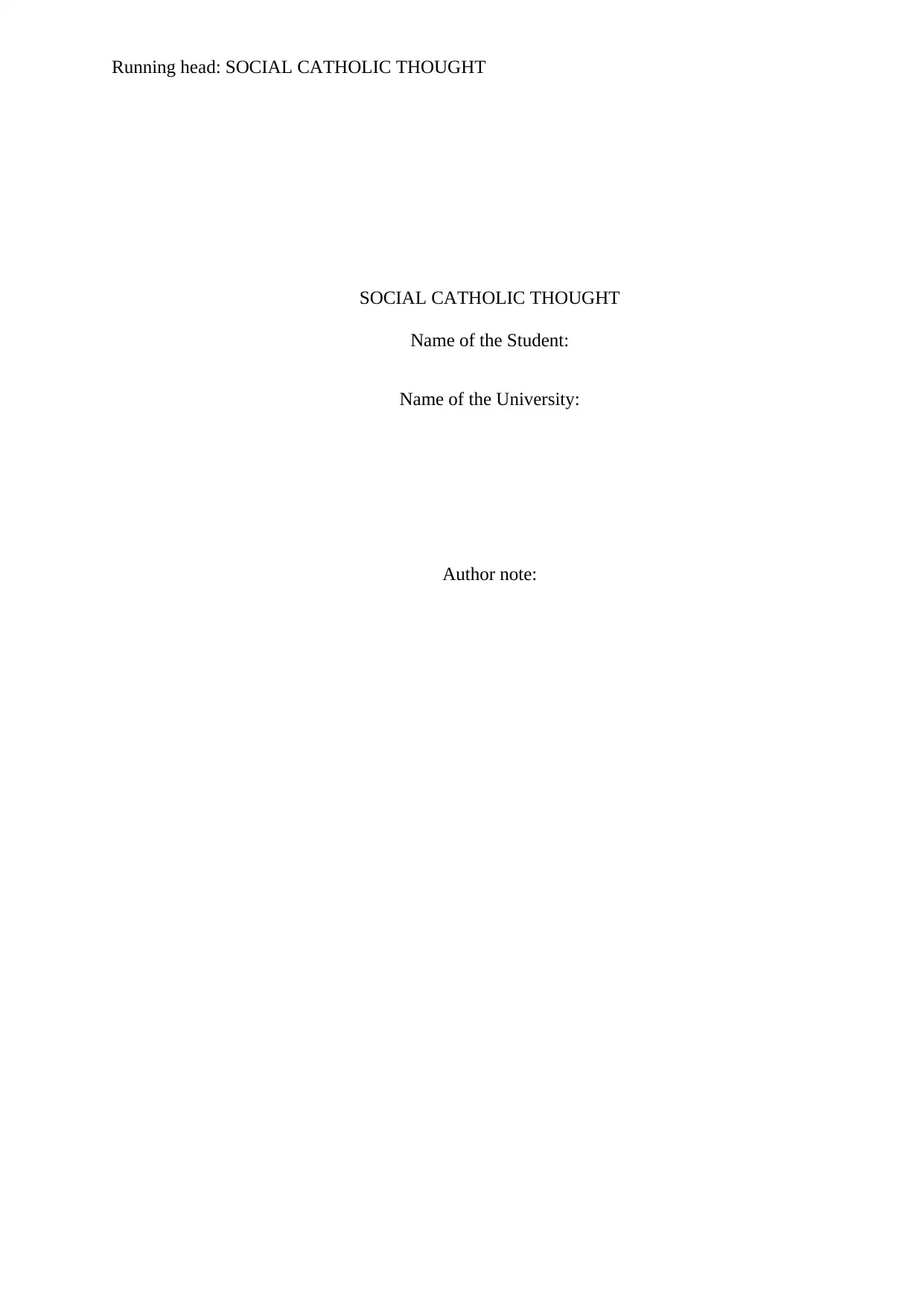
Running head: SOCIAL CATHOLIC THOUGHT
SOCIAL CATHOLIC THOUGHT
Name of the Student:
Name of the University:
Author note:
SOCIAL CATHOLIC THOUGHT
Name of the Student:
Name of the University:
Author note:
Paraphrase This Document
Need a fresh take? Get an instant paraphrase of this document with our AI Paraphraser
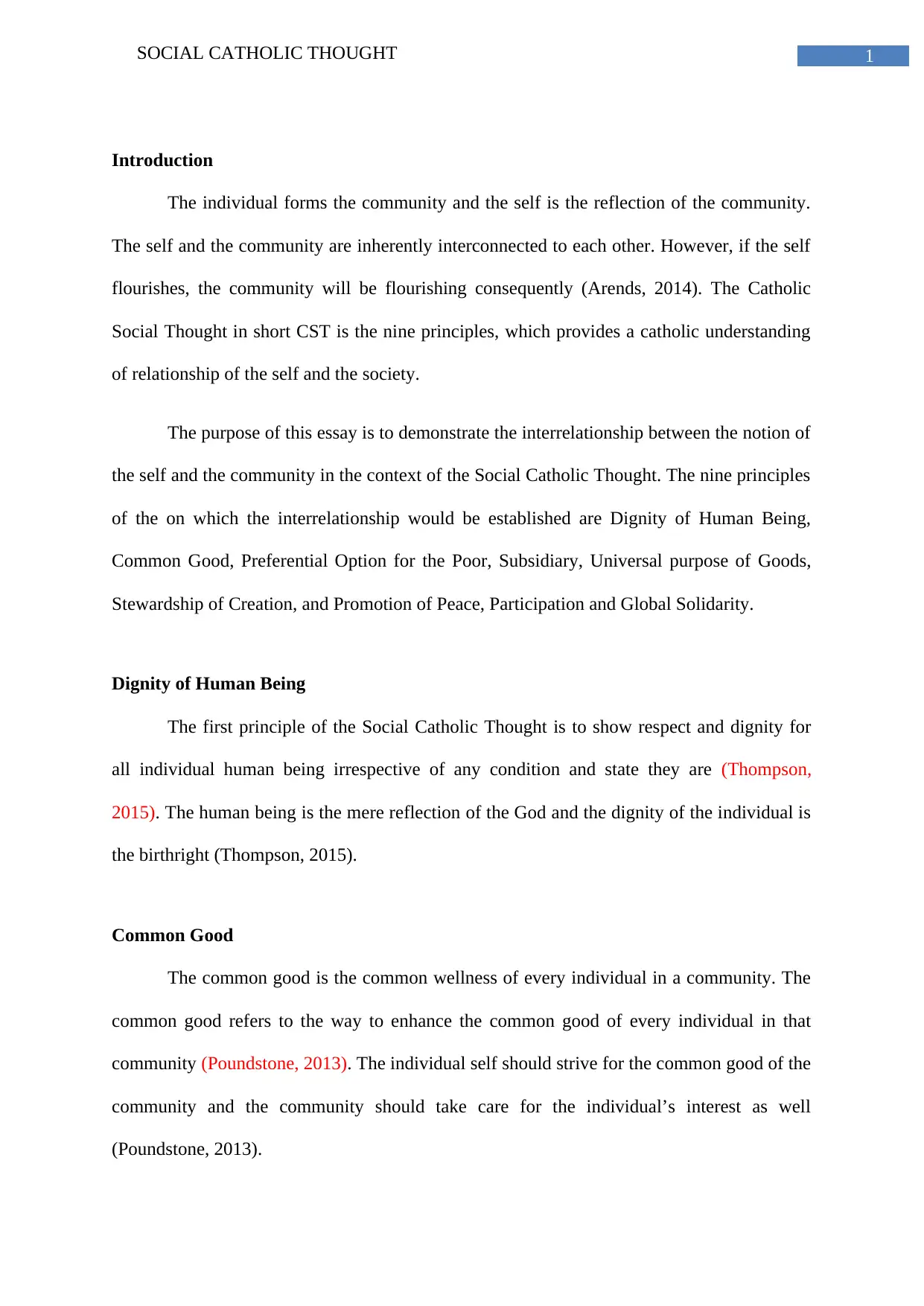
1SOCIAL CATHOLIC THOUGHT
Introduction
The individual forms the community and the self is the reflection of the community.
The self and the community are inherently interconnected to each other. However, if the self
flourishes, the community will be flourishing consequently (Arends, 2014). The Catholic
Social Thought in short CST is the nine principles, which provides a catholic understanding
of relationship of the self and the society.
The purpose of this essay is to demonstrate the interrelationship between the notion of
the self and the community in the context of the Social Catholic Thought. The nine principles
of the on which the interrelationship would be established are Dignity of Human Being,
Common Good, Preferential Option for the Poor, Subsidiary, Universal purpose of Goods,
Stewardship of Creation, and Promotion of Peace, Participation and Global Solidarity.
Dignity of Human Being
The first principle of the Social Catholic Thought is to show respect and dignity for
all individual human being irrespective of any condition and state they are (Thompson,
2015). The human being is the mere reflection of the God and the dignity of the individual is
the birthright (Thompson, 2015).
Common Good
The common good is the common wellness of every individual in a community. The
common good refers to the way to enhance the common good of every individual in that
community (Poundstone, 2013). The individual self should strive for the common good of the
community and the community should take care for the individual’s interest as well
(Poundstone, 2013).
Introduction
The individual forms the community and the self is the reflection of the community.
The self and the community are inherently interconnected to each other. However, if the self
flourishes, the community will be flourishing consequently (Arends, 2014). The Catholic
Social Thought in short CST is the nine principles, which provides a catholic understanding
of relationship of the self and the society.
The purpose of this essay is to demonstrate the interrelationship between the notion of
the self and the community in the context of the Social Catholic Thought. The nine principles
of the on which the interrelationship would be established are Dignity of Human Being,
Common Good, Preferential Option for the Poor, Subsidiary, Universal purpose of Goods,
Stewardship of Creation, and Promotion of Peace, Participation and Global Solidarity.
Dignity of Human Being
The first principle of the Social Catholic Thought is to show respect and dignity for
all individual human being irrespective of any condition and state they are (Thompson,
2015). The human being is the mere reflection of the God and the dignity of the individual is
the birthright (Thompson, 2015).
Common Good
The common good is the common wellness of every individual in a community. The
common good refers to the way to enhance the common good of every individual in that
community (Poundstone, 2013). The individual self should strive for the common good of the
community and the community should take care for the individual’s interest as well
(Poundstone, 2013).
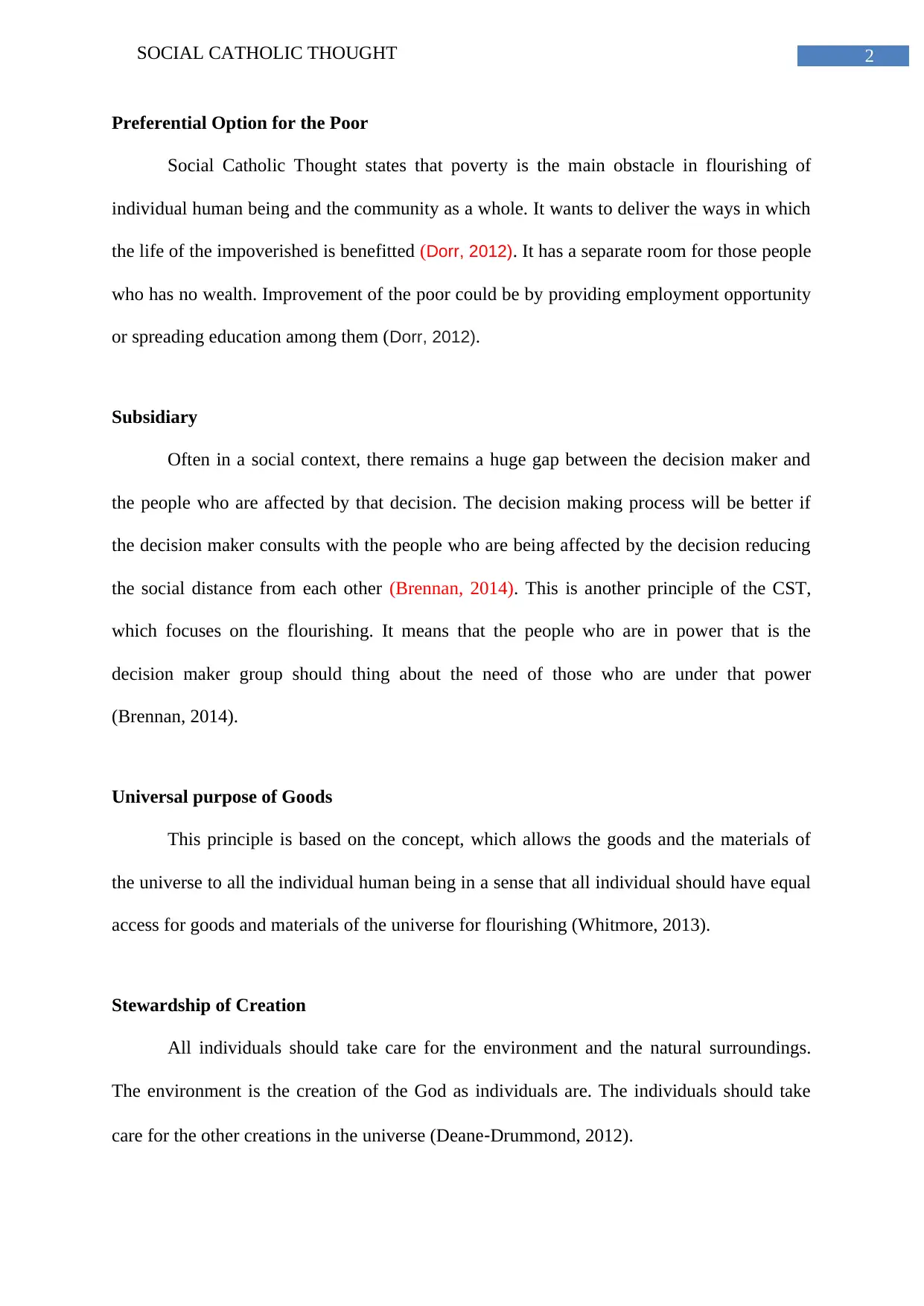
2SOCIAL CATHOLIC THOUGHT
Preferential Option for the Poor
Social Catholic Thought states that poverty is the main obstacle in flourishing of
individual human being and the community as a whole. It wants to deliver the ways in which
the life of the impoverished is benefitted (Dorr, 2012). It has a separate room for those people
who has no wealth. Improvement of the poor could be by providing employment opportunity
or spreading education among them (Dorr, 2012).
Subsidiary
Often in a social context, there remains a huge gap between the decision maker and
the people who are affected by that decision. The decision making process will be better if
the decision maker consults with the people who are being affected by the decision reducing
the social distance from each other (Brennan, 2014). This is another principle of the CST,
which focuses on the flourishing. It means that the people who are in power that is the
decision maker group should thing about the need of those who are under that power
(Brennan, 2014).
Universal purpose of Goods
This principle is based on the concept, which allows the goods and the materials of
the universe to all the individual human being in a sense that all individual should have equal
access for goods and materials of the universe for flourishing (Whitmore, 2013).
Stewardship of Creation
All individuals should take care for the environment and the natural surroundings.
The environment is the creation of the God as individuals are. The individuals should take
care for the other creations in the universe (Deane‐Drummond, 2012).
Preferential Option for the Poor
Social Catholic Thought states that poverty is the main obstacle in flourishing of
individual human being and the community as a whole. It wants to deliver the ways in which
the life of the impoverished is benefitted (Dorr, 2012). It has a separate room for those people
who has no wealth. Improvement of the poor could be by providing employment opportunity
or spreading education among them (Dorr, 2012).
Subsidiary
Often in a social context, there remains a huge gap between the decision maker and
the people who are affected by that decision. The decision making process will be better if
the decision maker consults with the people who are being affected by the decision reducing
the social distance from each other (Brennan, 2014). This is another principle of the CST,
which focuses on the flourishing. It means that the people who are in power that is the
decision maker group should thing about the need of those who are under that power
(Brennan, 2014).
Universal purpose of Goods
This principle is based on the concept, which allows the goods and the materials of
the universe to all the individual human being in a sense that all individual should have equal
access for goods and materials of the universe for flourishing (Whitmore, 2013).
Stewardship of Creation
All individuals should take care for the environment and the natural surroundings.
The environment is the creation of the God as individuals are. The individuals should take
care for the other creations in the universe (Deane‐Drummond, 2012).
⊘ This is a preview!⊘
Do you want full access?
Subscribe today to unlock all pages.

Trusted by 1+ million students worldwide
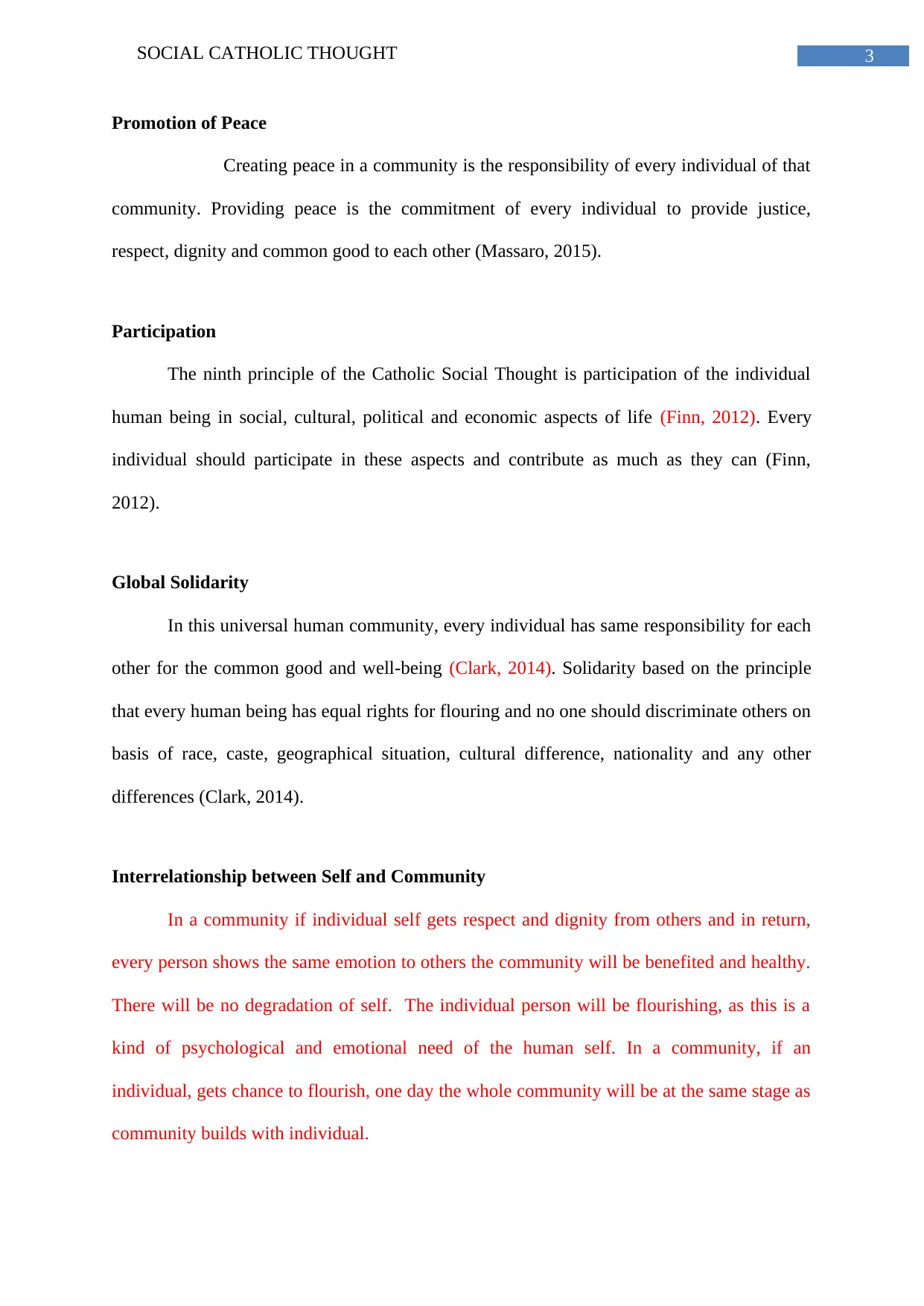
3SOCIAL CATHOLIC THOUGHT
Promotion of Peace
Creating peace in a community is the responsibility of every individual of that
community. Providing peace is the commitment of every individual to provide justice,
respect, dignity and common good to each other (Massaro, 2015).
Participation
The ninth principle of the Catholic Social Thought is participation of the individual
human being in social, cultural, political and economic aspects of life (Finn, 2012). Every
individual should participate in these aspects and contribute as much as they can (Finn,
2012).
Global Solidarity
In this universal human community, every individual has same responsibility for each
other for the common good and well-being (Clark, 2014). Solidarity based on the principle
that every human being has equal rights for flouring and no one should discriminate others on
basis of race, caste, geographical situation, cultural difference, nationality and any other
differences (Clark, 2014).
Interrelationship between Self and Community
In a community if individual self gets respect and dignity from others and in return,
every person shows the same emotion to others the community will be benefited and healthy.
There will be no degradation of self. The individual person will be flourishing, as this is a
kind of psychological and emotional need of the human self. In a community, if an
individual, gets chance to flourish, one day the whole community will be at the same stage as
community builds with individual.
Promotion of Peace
Creating peace in a community is the responsibility of every individual of that
community. Providing peace is the commitment of every individual to provide justice,
respect, dignity and common good to each other (Massaro, 2015).
Participation
The ninth principle of the Catholic Social Thought is participation of the individual
human being in social, cultural, political and economic aspects of life (Finn, 2012). Every
individual should participate in these aspects and contribute as much as they can (Finn,
2012).
Global Solidarity
In this universal human community, every individual has same responsibility for each
other for the common good and well-being (Clark, 2014). Solidarity based on the principle
that every human being has equal rights for flouring and no one should discriminate others on
basis of race, caste, geographical situation, cultural difference, nationality and any other
differences (Clark, 2014).
Interrelationship between Self and Community
In a community if individual self gets respect and dignity from others and in return,
every person shows the same emotion to others the community will be benefited and healthy.
There will be no degradation of self. The individual person will be flourishing, as this is a
kind of psychological and emotional need of the human self. In a community, if an
individual, gets chance to flourish, one day the whole community will be at the same stage as
community builds with individual.
Paraphrase This Document
Need a fresh take? Get an instant paraphrase of this document with our AI Paraphraser
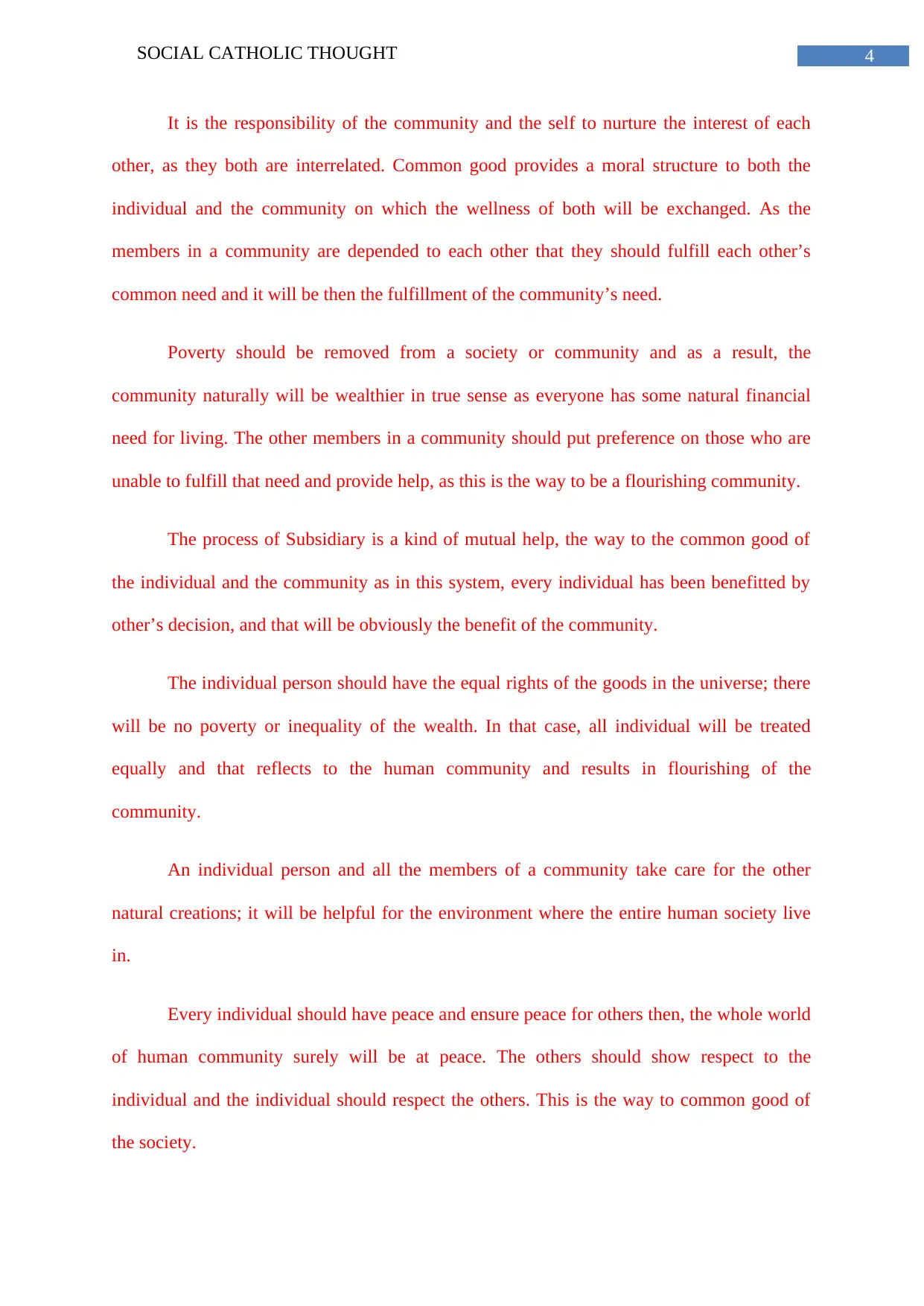
4SOCIAL CATHOLIC THOUGHT
It is the responsibility of the community and the self to nurture the interest of each
other, as they both are interrelated. Common good provides a moral structure to both the
individual and the community on which the wellness of both will be exchanged. As the
members in a community are depended to each other that they should fulfill each other’s
common need and it will be then the fulfillment of the community’s need.
Poverty should be removed from a society or community and as a result, the
community naturally will be wealthier in true sense as everyone has some natural financial
need for living. The other members in a community should put preference on those who are
unable to fulfill that need and provide help, as this is the way to be a flourishing community.
The process of Subsidiary is a kind of mutual help, the way to the common good of
the individual and the community as in this system, every individual has been benefitted by
other’s decision, and that will be obviously the benefit of the community.
The individual person should have the equal rights of the goods in the universe; there
will be no poverty or inequality of the wealth. In that case, all individual will be treated
equally and that reflects to the human community and results in flourishing of the
community.
An individual person and all the members of a community take care for the other
natural creations; it will be helpful for the environment where the entire human society live
in.
Every individual should have peace and ensure peace for others then, the whole world
of human community surely will be at peace. The others should show respect to the
individual and the individual should respect the others. This is the way to common good of
the society.
It is the responsibility of the community and the self to nurture the interest of each
other, as they both are interrelated. Common good provides a moral structure to both the
individual and the community on which the wellness of both will be exchanged. As the
members in a community are depended to each other that they should fulfill each other’s
common need and it will be then the fulfillment of the community’s need.
Poverty should be removed from a society or community and as a result, the
community naturally will be wealthier in true sense as everyone has some natural financial
need for living. The other members in a community should put preference on those who are
unable to fulfill that need and provide help, as this is the way to be a flourishing community.
The process of Subsidiary is a kind of mutual help, the way to the common good of
the individual and the community as in this system, every individual has been benefitted by
other’s decision, and that will be obviously the benefit of the community.
The individual person should have the equal rights of the goods in the universe; there
will be no poverty or inequality of the wealth. In that case, all individual will be treated
equally and that reflects to the human community and results in flourishing of the
community.
An individual person and all the members of a community take care for the other
natural creations; it will be helpful for the environment where the entire human society live
in.
Every individual should have peace and ensure peace for others then, the whole world
of human community surely will be at peace. The others should show respect to the
individual and the individual should respect the others. This is the way to common good of
the society.
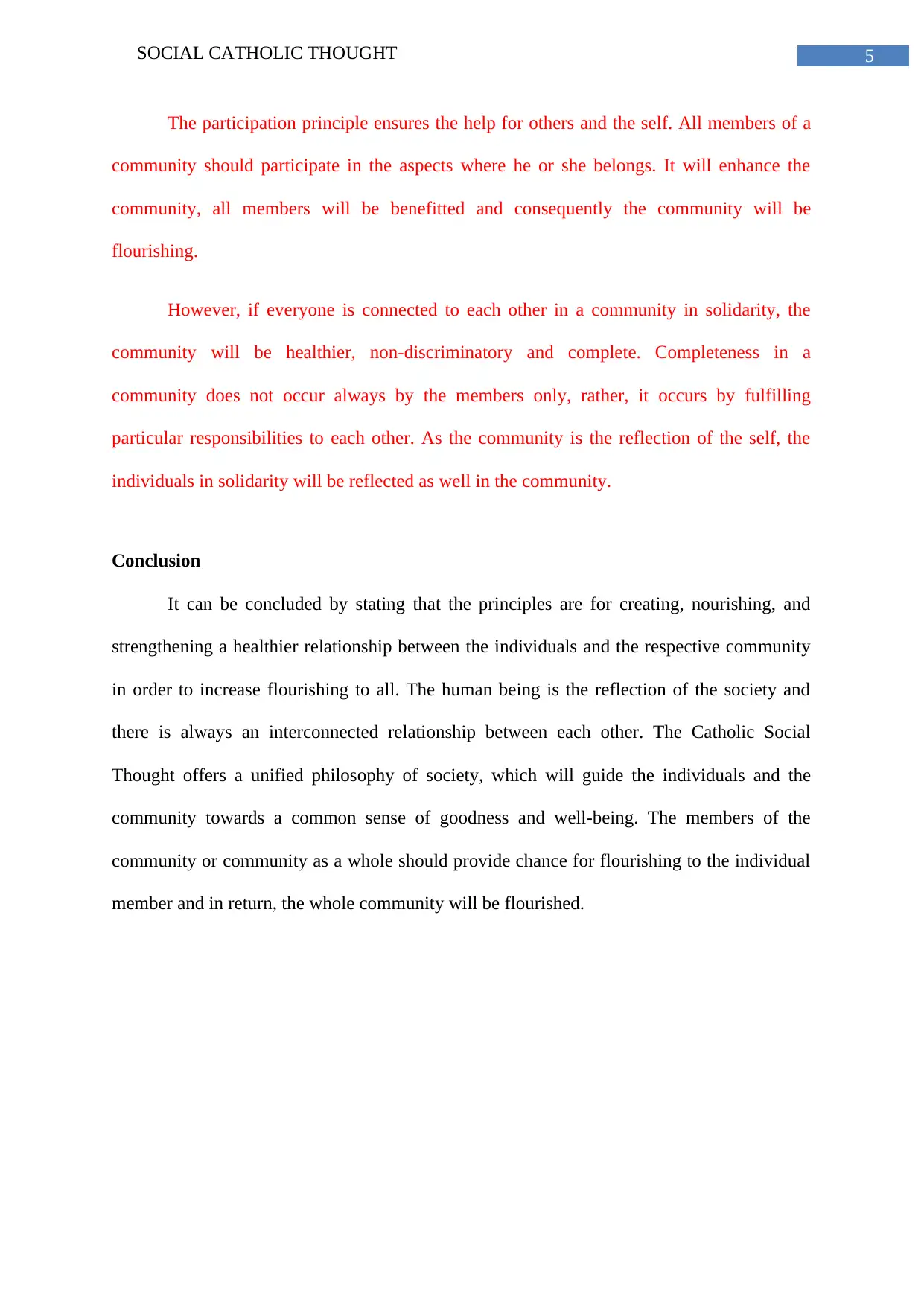
5SOCIAL CATHOLIC THOUGHT
The participation principle ensures the help for others and the self. All members of a
community should participate in the aspects where he or she belongs. It will enhance the
community, all members will be benefitted and consequently the community will be
flourishing.
However, if everyone is connected to each other in a community in solidarity, the
community will be healthier, non-discriminatory and complete. Completeness in a
community does not occur always by the members only, rather, it occurs by fulfilling
particular responsibilities to each other. As the community is the reflection of the self, the
individuals in solidarity will be reflected as well in the community.
Conclusion
It can be concluded by stating that the principles are for creating, nourishing, and
strengthening a healthier relationship between the individuals and the respective community
in order to increase flourishing to all. The human being is the reflection of the society and
there is always an interconnected relationship between each other. The Catholic Social
Thought offers a unified philosophy of society, which will guide the individuals and the
community towards a common sense of goodness and well-being. The members of the
community or community as a whole should provide chance for flourishing to the individual
member and in return, the whole community will be flourished.
The participation principle ensures the help for others and the self. All members of a
community should participate in the aspects where he or she belongs. It will enhance the
community, all members will be benefitted and consequently the community will be
flourishing.
However, if everyone is connected to each other in a community in solidarity, the
community will be healthier, non-discriminatory and complete. Completeness in a
community does not occur always by the members only, rather, it occurs by fulfilling
particular responsibilities to each other. As the community is the reflection of the self, the
individuals in solidarity will be reflected as well in the community.
Conclusion
It can be concluded by stating that the principles are for creating, nourishing, and
strengthening a healthier relationship between the individuals and the respective community
in order to increase flourishing to all. The human being is the reflection of the society and
there is always an interconnected relationship between each other. The Catholic Social
Thought offers a unified philosophy of society, which will guide the individuals and the
community towards a common sense of goodness and well-being. The members of the
community or community as a whole should provide chance for flourishing to the individual
member and in return, the whole community will be flourished.
⊘ This is a preview!⊘
Do you want full access?
Subscribe today to unlock all pages.

Trusted by 1+ million students worldwide
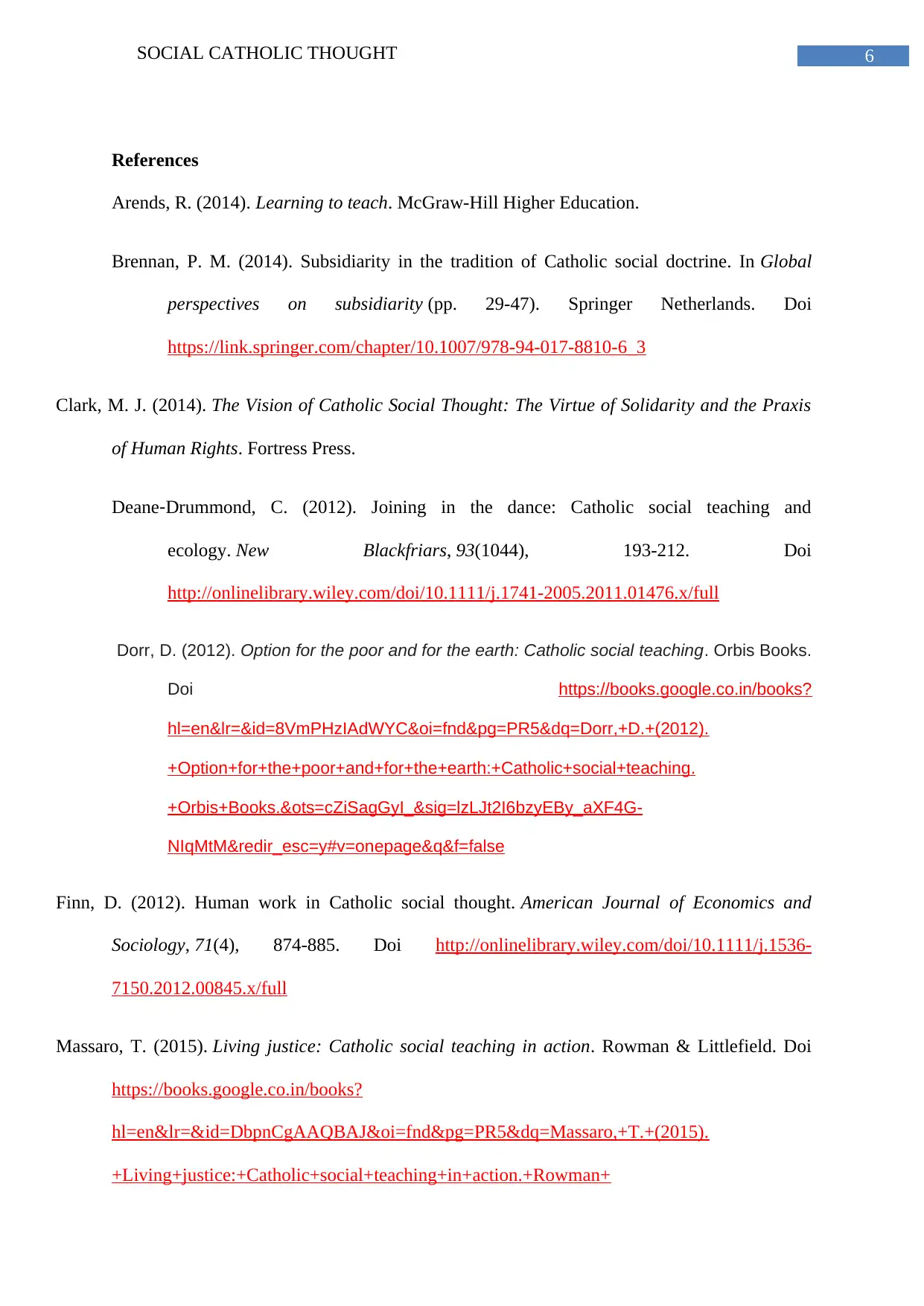
6SOCIAL CATHOLIC THOUGHT
References
Arends, R. (2014). Learning to teach. McGraw-Hill Higher Education.
Brennan, P. M. (2014). Subsidiarity in the tradition of Catholic social doctrine. In Global
perspectives on subsidiarity (pp. 29-47). Springer Netherlands. Doi
https://link.springer.com/chapter/10.1007/978-94-017-8810-6_3
Clark, M. J. (2014). The Vision of Catholic Social Thought: The Virtue of Solidarity and the Praxis
of Human Rights. Fortress Press.
Deane‐Drummond, C. (2012). Joining in the dance: Catholic social teaching and
ecology. New Blackfriars, 93(1044), 193-212. Doi
http://onlinelibrary.wiley.com/doi/10.1111/j.1741-2005.2011.01476.x/full
Dorr, D. (2012). Option for the poor and for the earth: Catholic social teaching. Orbis Books.
Doi https://books.google.co.in/books?
hl=en&lr=&id=8VmPHzIAdWYC&oi=fnd&pg=PR5&dq=Dorr,+D.+(2012).
+Option+for+the+poor+and+for+the+earth:+Catholic+social+teaching.
+Orbis+Books.&ots=cZiSagGyI_&sig=lzLJt2I6bzyEBy_aXF4G-
NIqMtM&redir_esc=y#v=onepage&q&f=false
Finn, D. (2012). Human work in Catholic social thought. American Journal of Economics and
Sociology, 71(4), 874-885. Doi http://onlinelibrary.wiley.com/doi/10.1111/j.1536-
7150.2012.00845.x/full
Massaro, T. (2015). Living justice: Catholic social teaching in action. Rowman & Littlefield. Doi
https://books.google.co.in/books?
hl=en&lr=&id=DbpnCgAAQBAJ&oi=fnd&pg=PR5&dq=Massaro,+T.+(2015).
+Living+justice:+Catholic+social+teaching+in+action.+Rowman+
References
Arends, R. (2014). Learning to teach. McGraw-Hill Higher Education.
Brennan, P. M. (2014). Subsidiarity in the tradition of Catholic social doctrine. In Global
perspectives on subsidiarity (pp. 29-47). Springer Netherlands. Doi
https://link.springer.com/chapter/10.1007/978-94-017-8810-6_3
Clark, M. J. (2014). The Vision of Catholic Social Thought: The Virtue of Solidarity and the Praxis
of Human Rights. Fortress Press.
Deane‐Drummond, C. (2012). Joining in the dance: Catholic social teaching and
ecology. New Blackfriars, 93(1044), 193-212. Doi
http://onlinelibrary.wiley.com/doi/10.1111/j.1741-2005.2011.01476.x/full
Dorr, D. (2012). Option for the poor and for the earth: Catholic social teaching. Orbis Books.
Doi https://books.google.co.in/books?
hl=en&lr=&id=8VmPHzIAdWYC&oi=fnd&pg=PR5&dq=Dorr,+D.+(2012).
+Option+for+the+poor+and+for+the+earth:+Catholic+social+teaching.
+Orbis+Books.&ots=cZiSagGyI_&sig=lzLJt2I6bzyEBy_aXF4G-
NIqMtM&redir_esc=y#v=onepage&q&f=false
Finn, D. (2012). Human work in Catholic social thought. American Journal of Economics and
Sociology, 71(4), 874-885. Doi http://onlinelibrary.wiley.com/doi/10.1111/j.1536-
7150.2012.00845.x/full
Massaro, T. (2015). Living justice: Catholic social teaching in action. Rowman & Littlefield. Doi
https://books.google.co.in/books?
hl=en&lr=&id=DbpnCgAAQBAJ&oi=fnd&pg=PR5&dq=Massaro,+T.+(2015).
+Living+justice:+Catholic+social+teaching+in+action.+Rowman+
Paraphrase This Document
Need a fresh take? Get an instant paraphrase of this document with our AI Paraphraser
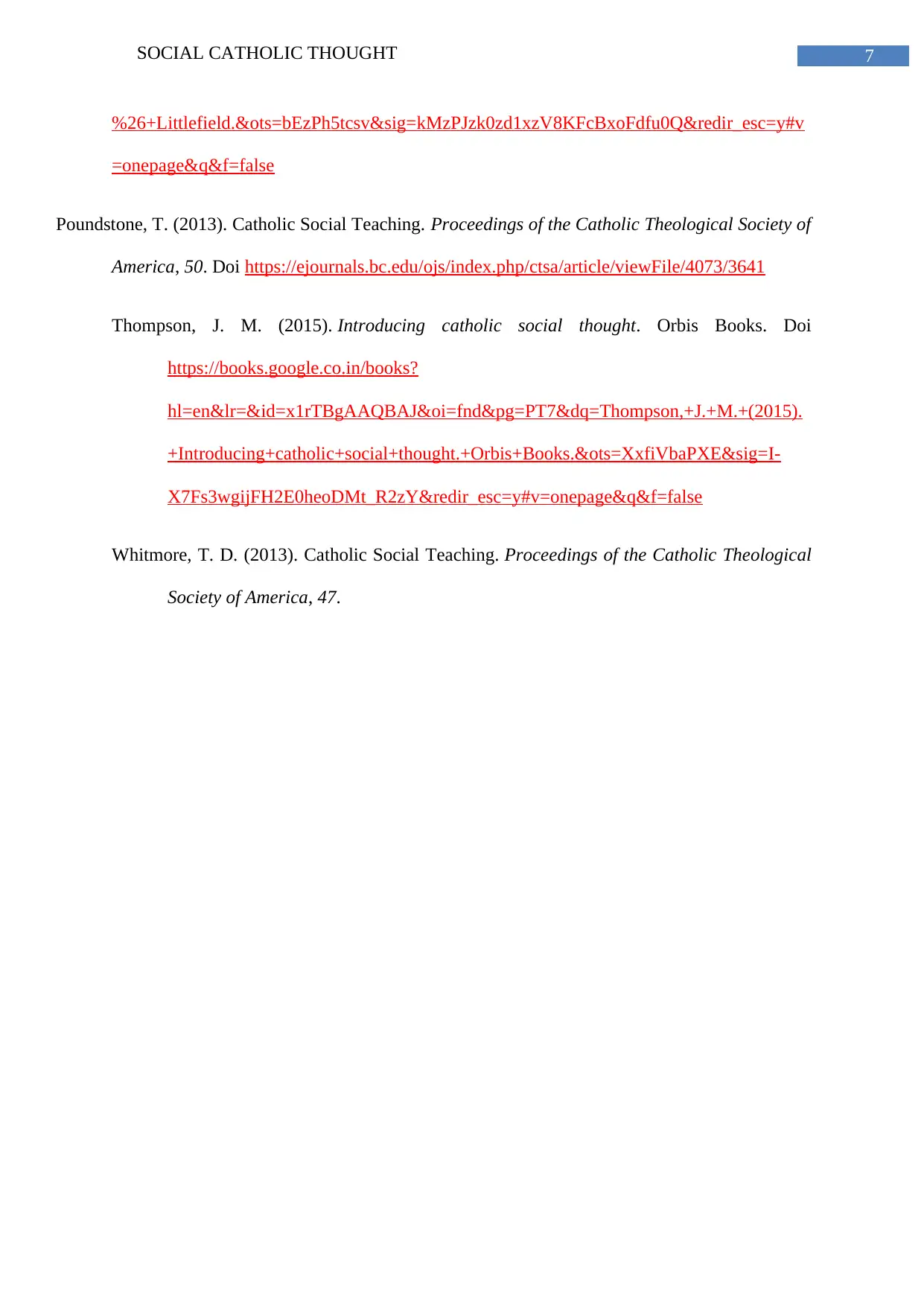
7SOCIAL CATHOLIC THOUGHT
%26+Littlefield.&ots=bEzPh5tcsv&sig=kMzPJzk0zd1xzV8KFcBxoFdfu0Q&redir_esc=y#v
=onepage&q&f=false
Poundstone, T. (2013). Catholic Social Teaching. Proceedings of the Catholic Theological Society of
America, 50. Doi https://ejournals.bc.edu/ojs/index.php/ctsa/article/viewFile/4073/3641
Thompson, J. M. (2015). Introducing catholic social thought. Orbis Books. Doi
https://books.google.co.in/books?
hl=en&lr=&id=x1rTBgAAQBAJ&oi=fnd&pg=PT7&dq=Thompson,+J.+M.+(2015).
+Introducing+catholic+social+thought.+Orbis+Books.&ots=XxfiVbaPXE&sig=I-
X7Fs3wgijFH2E0heoDMt_R2zY&redir_esc=y#v=onepage&q&f=false
Whitmore, T. D. (2013). Catholic Social Teaching. Proceedings of the Catholic Theological
Society of America, 47.
%26+Littlefield.&ots=bEzPh5tcsv&sig=kMzPJzk0zd1xzV8KFcBxoFdfu0Q&redir_esc=y#v
=onepage&q&f=false
Poundstone, T. (2013). Catholic Social Teaching. Proceedings of the Catholic Theological Society of
America, 50. Doi https://ejournals.bc.edu/ojs/index.php/ctsa/article/viewFile/4073/3641
Thompson, J. M. (2015). Introducing catholic social thought. Orbis Books. Doi
https://books.google.co.in/books?
hl=en&lr=&id=x1rTBgAAQBAJ&oi=fnd&pg=PT7&dq=Thompson,+J.+M.+(2015).
+Introducing+catholic+social+thought.+Orbis+Books.&ots=XxfiVbaPXE&sig=I-
X7Fs3wgijFH2E0heoDMt_R2zY&redir_esc=y#v=onepage&q&f=false
Whitmore, T. D. (2013). Catholic Social Teaching. Proceedings of the Catholic Theological
Society of America, 47.
1 out of 8
Related Documents
Your All-in-One AI-Powered Toolkit for Academic Success.
+13062052269
info@desklib.com
Available 24*7 on WhatsApp / Email
![[object Object]](/_next/static/media/star-bottom.7253800d.svg)
Unlock your academic potential
Copyright © 2020–2026 A2Z Services. All Rights Reserved. Developed and managed by ZUCOL.



